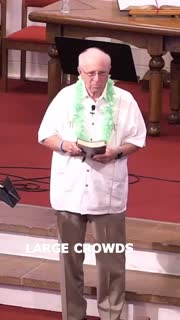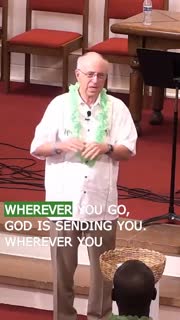Embracing Compassion: Answering God's Call with 'Hineni'
Summary
### Summary
In today's sermon, we explored the profound compassion of Jesus as He ministered to the harassed and helpless crowds in Galilee. Jesus saw the people as sheep without a shepherd, worn down and thrown down by life's burdens. This deep empathy led Him to send out His apostles to share the good news and bring healing. We also delved into the concept of "Hineni," a Hebrew term meaning "Here I am," which signifies a readiness to serve God even before knowing the task. This readiness was exemplified by Ananias in the New Testament and a modern-day story of Alice, a retired school teacher who chose to forgive her neighbor and serve him despite his wrongdoings. Alice's journey of forgiveness and service highlighted the importance of seeing others through "people eyes," the compassionate eyes of Jesus, and believing that God can use us in every situation. The sermon concluded with a call to embrace the adventure God has for each of us, to say "Hineni," and to go forth in His grace, knowing that wherever we are, God has placed us there for a purpose.
### Key Takeaways
1. Jesus' Compassion for the Harassed and Helpless: Jesus saw the crowds as harassed and helpless, like sheep without a shepherd. This compassion moved Him to act, sending His apostles to minister to them. We are called to see the world through Jesus' compassionate eyes and respond to the needs around us with empathy and action. [01:00:39]
2. Understanding "Hineni": The Hebrew word "Hineni" means "Here I am," signifying a readiness to serve God even before knowing the task. This attitude of preemptive obedience is crucial for a life of faith. It means our answer to God's call is "yes" before we even hear the question. [01:17:14]
3. The Power of Forgiveness: Alice's story teaches us the transformative power of forgiveness. By choosing to forgive her neighbor who wronged her, Alice opened the door to being used by God in unexpected ways. Forgiveness is not just about letting go of anger but also about being open to God's purposes. [01:21:50]
4. Seeing with "People Eyes": To have "people eyes" is to see others as Jesus sees them, with compassion and a desire to serve. This perspective changes how we interact with those around us, making us instruments of God's love and grace. Alice's actions towards her neighbor's family after his death exemplify this principle. [01:25:47]
5. Embracing God's Adventure: We are all sent by God to specific places and people for a reason. Embracing this adventure means being willing to say "Hineni" and trusting that God has a purpose for us wherever we are. This mindset transforms our daily lives into opportunities for divine encounters and service. [01:24:38]
### Youtube Chapters
[0:00] - Welcome
[01:00:39] - Jesus' Compassion for the Crowds
[01:03:32] - Harassed and Helpless
[01:06:01] - Turning to the Apostles
[01:08:24] - The Waitress and the Boy
[01:11:36] - The Importance of "Send"
[01:13:29] - Understanding "Hineni"
[01:17:14] - Ananias' Obedience
[01:18:46] - Alice and the Tree
[01:20:50] - Alice's Forgiveness
[01:21:50] - Sermon on the Mount
[01:22:55] - People Eyes
[01:24:38] - Alice's Continued Service
[01:25:47] - Embracing God's Adventure
[01:34:20] - Closing and Sending Forth
[01:35:37] - Final Blessing
Study Guide
### Bible Study Discussion Guide
#### Bible Reading
1. Matthew 9:36-38 (NIV)
> "When he saw the crowds, he had compassion on them, because they were harassed and helpless, like sheep without a shepherd. Then he said to his disciples, 'The harvest is plentiful but the workers are few. Ask the Lord of the harvest, therefore, to send out workers into his harvest field.'"
2. Acts 9:10-17 (NIV)
> "In Damascus there was a disciple named Ananias. The Lord called to him in a vision, 'Ananias!' 'Yes, Lord,' he answered. The Lord told him, 'Go to the house of Judas on Straight Street and ask for a man from Tarsus named Saul, for he is praying. In a vision he has seen a man named Ananias come and place his hands on him to restore his sight.' 'Lord,' Ananias answered, 'I have heard many reports about this man and all the harm he has done to your holy people in Jerusalem. And he has come here with authority from the chief priests to arrest all who call on your name.' But the Lord said to Ananias, 'Go! This man is my chosen instrument to proclaim my name to the Gentiles and their kings and to the people of Israel. I will show him how much he must suffer for my name.' Then Ananias went to the house and entered it. Placing his hands on Saul, he said, 'Brother Saul, the Lord—Jesus, who appeared to you on the road as you were coming here—has sent me so that you may see again and be filled with the Holy Spirit.'"
3. Matthew 5:7, 9 (NIV)
> "Blessed are the merciful, for they will be shown mercy. Blessed are the peacemakers, for they will be called children of God."
#### Observation Questions
1. What did Jesus feel when He saw the crowds in Galilee, and how did He describe them? ([01:00:39])
2. What does the Hebrew word "Hineni" mean, and how did Ananias exemplify this attitude? ([01:17:14])
3. How did Alice respond to her neighbor after he cut down her tree, and what biblical principle did she follow? ([01:21:50])
4. What does it mean to see others with "people eyes," and how did Alice demonstrate this in her actions? ([01:25:47])
#### Interpretation Questions
1. Why is Jesus' compassion for the harassed and helpless significant for understanding His ministry and mission? ([01:00:39])
2. How does the concept of "Hineni" challenge our usual approach to serving God? ([01:17:14])
3. In what ways does forgiveness open the door for God to use us, as seen in Alice's story? ([01:21:50])
4. How can seeing others with "people eyes" transform our interactions and relationships? ([01:25:47])
#### Application Questions
1. Reflect on a time when you felt harassed or helpless. How did you experience Jesus' compassion during that time? How can you extend that same compassion to others now? ([01:00:39])
2. Are you ready to say "Hineni" to God? What might be holding you back from preemptively saying "yes" to God's call? ([01:17:14])
3. Think of someone you need to forgive. What steps can you take this week to let go of any anger or resentment and open yourself to God's purposes? ([01:21:50])
4. Identify a person in your life who you can see with "people eyes." What specific actions can you take to show them compassion and serve them this week? ([01:25:47])
5. How can you embrace the adventure God has for you in your current situation? What does saying "Hineni" look like in your daily life? ([01:24:38])
6. Consider a situation where you felt sent by God to help someone. How did that experience impact your faith and understanding of God's purpose for you? ([01:25:47])
7. How can you cultivate a mindset of being sent by God in your everyday interactions and tasks? What practical steps can you take to remind yourself of this calling? ([01:35:37])
Devotional
### Day 1: Compassion in Action
Description: Jesus' compassion for the harassed and helpless crowds in Galilee is a profound example of empathy in action. He saw the people as sheep without a shepherd, worn down by life's burdens, and this moved Him deeply. His response was not just to feel pity but to act—He sent out His apostles to share the good news and bring healing to those in need. This teaches us that true compassion involves seeing the needs around us and responding with both empathy and tangible actions. We are called to see the world through Jesus' compassionate eyes and to be moved to act in ways that alleviate the suffering of others. [01:00:39]
Bible Passage: "When he saw the crowds, he had compassion for them, because they were harassed and helpless, like sheep without a shepherd. Then he said to his disciples, 'The harvest is plentiful, but the laborers are few; therefore pray earnestly to the Lord of the harvest to send out laborers into his harvest.'" (Matthew 9:36-38, ESV)
Reflection: Think of someone in your life who seems harassed and helpless. How can you show them compassion through a specific action today?
### Day 2: Preemptive Obedience
Description: The Hebrew word "Hineni," meaning "Here I am," signifies a readiness to serve God even before knowing the task. This attitude of preemptive obedience is crucial for a life of faith. It means our answer to God's call is "yes" before we even hear the question. This readiness was exemplified by Ananias in the New Testament, who obeyed God's call to minister to Saul despite his fears. Embracing "Hineni" means trusting God fully and being willing to step into the unknown, confident that He will guide and equip us for whatever He asks us to do. [01:17:14]
Bible Passage: "And the Lord said to him, 'Rise and go to the street called Straight, and at the house of Judas look for a man of Tarsus named Saul, for behold, he is praying, and he has seen in a vision a man named Ananias come in and lay his hands on him so that he might regain his sight.'" (Acts 9:11-12, ESV)
Reflection: Is there an area in your life where you feel God is calling you to act, but you are hesitant? What would it look like to say "Hineni" and step forward in faith today?
### Day 3: The Transformative Power of Forgiveness
Description: Alice's story of forgiving her neighbor who wronged her teaches us about the transformative power of forgiveness. By choosing to forgive, Alice opened the door to being used by God in unexpected ways. Forgiveness is not just about letting go of anger but also about being open to God's purposes. It allows us to move beyond our hurt and become instruments of God's grace and love. Forgiveness can transform relationships and bring healing, not just to the one who forgives but also to the one who is forgiven. [01:21:50]
Bible Passage: "Bearing with one another and, if one has a complaint against another, forgiving each other; as the Lord has forgiven you, so you also must forgive." (Colossians 3:13, ESV)
Reflection: Think of someone you need to forgive. Can you ask God to help you begin to extend His love and forgiveness to them today?
### Day 4: Seeing with "People Eyes"
Description: To have "people eyes" is to see others as Jesus sees them, with compassion and a desire to serve. This perspective changes how we interact with those around us, making us instruments of God's love and grace. Alice's actions towards her neighbor's family after his death exemplify this principle. By seeing others through "people eyes," we can respond to their needs with empathy and kindness, reflecting Jesus' love in our daily interactions. This mindset helps us to be more attentive to the struggles of others and to offer support and encouragement in meaningful ways. [01:25:47]
Bible Passage: "Let each of you look not only to his own interests, but also to the interests of others. Have this mind among yourselves, which is yours in Christ Jesus." (Philippians 2:4-5, ESV)
Reflection: How can you practice seeing others with "people eyes" today? Is there someone you can reach out to with a kind word or act of service?
### Day 5: Embracing God's Adventure
Description: We are all sent by God to specific places and people for a reason. Embracing this adventure means being willing to say "Hineni" and trusting that God has a purpose for us wherever we are. This mindset transforms our daily lives into opportunities for divine encounters and service. By being open to God's leading, we can experience the joy and fulfillment that comes from being used by Him in ways we might never have imagined. Embracing God's adventure means living with a sense of purpose and expectation, knowing that He has placed us where we are for a reason. [01:24:38]
Bible Passage: "For we are his workmanship, created in Christ Jesus for good works, which God prepared beforehand, that we should walk in them." (Ephesians 2:10, ESV)
Reflection: What is one way you can embrace the adventure God has for you today? How can you be more open to His leading in your daily life?
Quotes
1. "Large crowds gather, And Jesus feels compassion. Because they were harassed and helpless like sheep without a shepherd. Harassed and helpless mean different things. Harassed means so worn down, tired. But helpless means thrown down very hard. So, harassed, worn down, I opened the refrigerator at home and a bowl of fruit caught and flipped out all over the floor. So, harassed. But helpless, my brother's wife has cancer, very serious. She's helpless, thrown down. So, Jesus sees people harassed, helpless. Worn down, thrown down." [01:00:39] (109 seconds)
2. "Hineni means my answer was yes before you even asked before you even asked before you even asked you asked me to clean the room Hineni ask me to give you a ride Hineni me to do a job I don't want to do Hineni here I am so God said Ananias he said here I am and God said I want you to go see a man named Saul so Ananias went from Hineni here I am to Hineno but God said go so Ananias received people eyes he believed God would use him and he saw himself as sent to Saul." [01:17:14] (109 seconds)
3. "Alice did this she went and she let go of her neighbor the word forgive in the Bible means means let go she let go of him she let go and she received people eyes the eyes of Jesus for her neighbor. She decided to believe God would use her with her neighbor. She saw herself as sent. She knew she was going to take the adventure the Lord had for her. Hineni. She went home and baked a chocolate cake. Took it to her neighbor, knocked on the door. He opened the door, opened the door, Saw her. Slammed it in her face. But she was going to take the adventure the Lord had for her." [01:22:55] (101 seconds)
4. "In two days she picked flowers. Back to the house. He opened the door a little. He did not slam it. He did not receive the flowers. Closed the door. She went home. Two days later. She was very. Very surprised to learn. Her neighbor died. From a giant heart attack. Who do you think. The neighbor's wife. And all of his children. Look to to help them. It was Alice. She had people eyes for them. And she believed God would use her. And she was sent. So. Take the adventure. God has for you. And can you all say Hineni. Hineni. Just say Hineni. Hineni. Hineni. Amen." [01:24:38] (118 seconds)
5. "Wherever you go, God is sending you. Wherever you are, our Lord has put you there. Jesus, who lives in you, has something He wants to do through you. Believe it and go in His grace Thank you." [01:35:37] (39 seconds)





